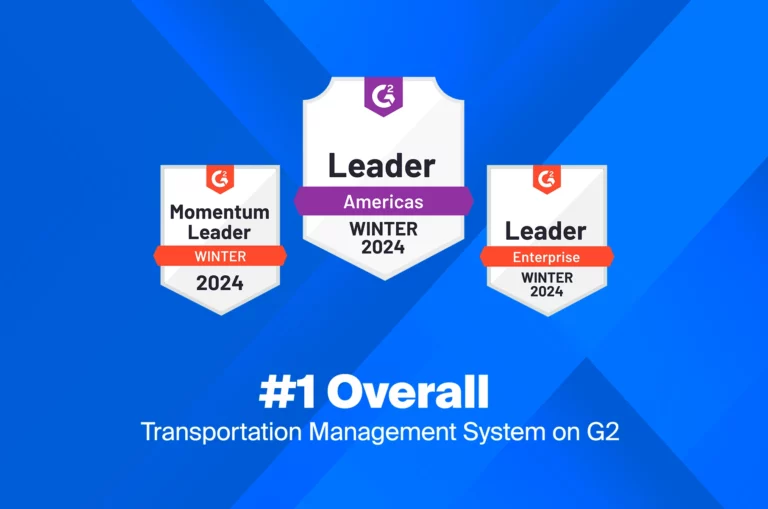Key Takeaways
- Definition of Double Brokering: Double brokering occurs when a freight organization acts as an intermediary for a shipment without informing the shipping party, often subcontracting the transportation to another entity.
- Impacts & Legal Consequences: Double brokering can lead to a lack of transparency, potential delays, damaged goods, and payment disputes. Engaging in this practice is illegal according to MAP 21 legislation, and the penalties can include fines, license revocation, and even imprisonment for severe cases.
- Prevention Methods: To mitigate the risks of double brokering, freight organizations should establish trusted relationships, maintain clear communication, and leverage real-time shipment tracking technologies.
What Is Double Brokering?
When it comes to the freight industry, double brokering can be defined when a freight organization acts as a middleman for fulfilling a shipment, and never communicates that information to the shipping party.
Examples of Double Brokering
Double brokering will look different depending on the situation and the parties involved.
To break it down, let’s look at a few examples in which double brokering may occur for different parties.
- Freight broker tenders a shipment to carrier, carrier then assigns/brokers load to another carrier without the freight broker’s knowledge.
- Shipper tenders a shipment to carrier, carrier then assigns/brokers load to another carrier without shippers’ knowledge.
- A Shipper tenders a shipment to a Freight Broker, Freight Broker then assigns/brokers load to another freight broker or carrier without shippers’ knowledge.
Scenarios Explained
Party A (Freight Broker or Shipper) is responsible for overseeing the transportation of a shipment from origin to destination. Party A then hires Party B (Carrier or Freight Broker) to execute the transportation on their behalf.
Double brokering happens when Party B then assigns or brokers the load to Party C (a different Carrier or Freight broker) without communicating that knowledge to Party A.
In this case, the original carrier acts as an intermediary between the freight broker and the second carrier, but instead of directly arranging the transportation, they subcontract it to another party.
How Does It Impact the Freight Industry
Double brokering can have significant impacts on the freight industry and the parties involved. In fact, it’s estimated that the illegal practice is costing the industry hundreds of millions of dollars annually.
Here are a few ways in which it can affect different stakeholders:
- Shippers and customers: When double brokering occurs, shippers and customers may experience negative consequences. These can include lack of transparency in the transportation process, potential delays or disruptions in delivery, and increased risk of issues such as damaged goods, lost shipments, or payment disputes. Double brokering can erode trust between shippers and brokers, potentially leading to strained relationships.
- Freight brokers: Double brokering can harm the reputation and credibility of freight brokers. Engaging in double brokering practices can lead to customer dissatisfaction, loss of business, and damage to the broker’s standing in the industry. It may also result in legal and financial repercussions if contracts are breached or disputes arise.
- Carriers: Double brokering can impact carriers in several ways. If a carrier unknowingly accepts a double-brokered load, they may face difficulties in receiving payment or resolving issues related to the shipment. It can also lead to inefficient use of carrier resources, as double-brokered loads may not be accurately represented in terms of weight, dimensions, or other critical information.
- Industry reputation and regulations: Double brokering undermines the integrity and professionalism of the freight industry. It can create an environment of mistrust and uncertainty among stakeholders. In response, regulatory authorities and industry organizations may implement stricter regulations or guidelines to combat double brokering practices and protect the interests of shippers, brokers, and carriers.
Overall, double brokering has the potential to disrupt the smooth operation of the freight industry, strain relationships, and introduce risks and challenges for all parties involved. It is generally viewed as an undesirable practice that should be avoided to maintain transparency and trust within the industry.
Is Double Brokering Illegal in the Freight World?
According to MAP 21 legislation, double brokering is considered both fraudulent and illegal.
According to the FMCSA (Federal Motor Carrier Safety Administration)
“A broker or freight forwarder who knowingly engages in interstate brokerage or freight forwarding operations without the required operating authority is liable to the United States for a civil penalty not to exceed $10,000 and can be liable to any injured third party for all valid claims regardless of the amount.”
Can You Go to Jail for Double Brokering?
The simple answer is yes, if convicted of double brokering, imprisonment is possible for the convicted parties.
Engaging in double brokering does have legal consequences, and in some cases, it may result in criminal charges that could potentially lead to imprisonment. However, the severity of the penalties and the likelihood of imprisonment can vary depending on the jurisdiction and the specific circumstances of the case.
What are the Penalties for Double Brokering?
While imprisonment is possible for severe cases of double brokering, fines and penalties are often more common. In the United States, the penalties for double brokering can include:
Civil Penalties: The Federal Motor Carrier Safety Administration (FMCSA) can impose civil penalties for violations related to double brokering. The fines can vary depending on the severity of the violation, ranging from a few thousand dollars to tens of thousands of dollars.
License Revocation: The FMCSA has the authority to revoke or suspend the operating authority of a broker engaged in double brokering. This means that the broker may no longer be able to legally operate as a freight broker.
Legal Action: In addition to administrative penalties, customers who have been affected by double brokering can take legal action against the broker to seek compensation for damages incurred, including financial losses and other related expenses. This can result in civil lawsuits and potentially substantial financial liabilities for the broker.
What Does the FMCSA Say About It?
The Federal Motor Carrier Safety Administration (FMCSA) is responsible for regulating and overseeing interstate commercial motor carriers, including freight brokers. They have put in place regulations and guidelines to address the issue of double brokering within the freight brokerage industry in the United States.
While the FMCSA does not explicitly mention “double brokering” in its regulations, it does have specific regulations related to broker operations and requirements. These regulations are designed to promote fair and ethical practices within the industry and protect the interests of both shippers and carriers.
Brokers are required to obtain operating authority from the FMCSA, which involves meeting specific financial and insurance requirements. Brokers are also expected to maintain records of their transactions and provide accurate and timely information to both shippers and carriers.
In addition to these general regulations, the FMCSA can take enforcement actions against brokers engaged in fraudulent practices or those that fail to fulfill their obligations. This can include imposing civil penalties, revoking or suspending the broker’s operating authority, and taking other appropriate actions to address non-compliance and protect the interests of the parties involved.
7 Ways to Prevent & Mitigate Double Brokering
When it comes to the freight industry, double brokering is often unenforceable, which causes the illegal operation to persist. However, freight organizations can mitigate the risks and help protect other parties by performing the practices below.
- Establish strong relationships: Build strong partnerships with reputable carriers and freight brokers who have a track record of ethical practices. Establishing trusted relationships can reduce the likelihood of double brokering since you can rely on the integrity and reliability of your business partners.
- Do your homework: Before working with a new freight broker or carrier, conduct thorough due diligence. Research their reputation, check references, and verify their credentials and licenses. This helps ensure that you are partnering with trustworthy and reliable entities.
- Clear contracts and agreements: Clearly outline expectations, responsibilities, and restrictions in your contracts and agreements with freight brokers and carriers. Include provisions explicitly prohibiting double brokering without your consent. Be sure to review and negotiate the terms to ensure they adequately protect your interests.
- Communication and transparency: Maintain open lines of communication with your freight broker or carrier throughout the transportation process. Regularly check in and request updates on the status of your shipment. Transparent and frequent communication helps deter double brokering and allows for early detection if any issues arise.
- Track your shipments: Utilize shipment tracking technologies and systems to monitor the movement of your goods. This can help identify any discrepancies or unauthorized reassignments of your shipments.
- Work with trusted industry associations: Engage with reputable industry associations and organizations that promote ethical standards and best practices. These associations often have codes of conduct and membership requirements that discourage double brokering and ensure a higher level of professionalism.
- Report violations: If you suspect double brokering or encounter any unethical practices, report the violation to the appropriate authorities, such as transportation regulatory agencies or industry watchdogs. Reporting such violations helps maintain the integrity of the industry and protects the interests of all stakeholders.
Double Brokering vs. Co-Brokering
In the freight world, these two practices often get mixed in together. And although they are quite similar the difference between the two ultimately comes down to fraudulent behavior.
As explained before, is a fraudulent practice in which a broker accepts payment from a customer for arranging the transportation of goods but then subcontracts the job to another broker without the customer’s knowledge or consent.
The illegality comes from lack of communication and subcontracting with another party without informing customers.
Contrary to double brokering, co-brokering is 100% legal.
It can be defined as a legitimate practice where two or more brokers work together to arrange transportation for a shipment. In co-brokering, one broker, known as the “originating broker” or “lead broker,” secures the customer and negotiates the terms of the shipment. The originating broker then subcontracts a portion of the job to another broker, known as the “sub-broker” or “co-broker,” who helps with the execution of the transportation.
The main difference here is that all parties are informed and agree to a contract for the negotiation of the terms.
Prevent Double Brokering with MacroPoint Capacity
If you are looking to defend your business from double brokering, one prevention tactic is to leverage technology to verify a carrier’s authenticity.
Through Descartes MacroPoint Capacity, you have the ability to validate a carrier’s MC number within the platform by referencing it’s FMCSA status. Users can also click through to that carrier’s corresponding FMCSA listing, and thoroughly scrutinize the motor carrier’s details on the FMCSA site. If the data does not align with your expectations and the FMCSA’s information, you may have reason to be concerned. A deactivated or suspended MC number should also be a reason for extra scrutiny.
Explore the capabilities of Descartes MacroPoint Capacity here.
How Real Time Visibility Can Help
Real-time visibility solutions have offered a powerful tool to combat the practice of double brokering.
By leveraging advanced tracking technologies and data analytics, real-time visibility enables shippers, brokers, and carriers to monitor the movement of their shipments in real-time.
This heightened visibility allows them to detect any unauthorized changes in the routing or handling of the freight, helping to identify instances of double brokering promptly.
With real-time visibility, stakeholders in the transportation industry can take proactive measures to prevent double brokering, safeguard cargo integrity, and foster trust and transparency in their operations.
Wish to learn more? Speak with a member of our team today!


